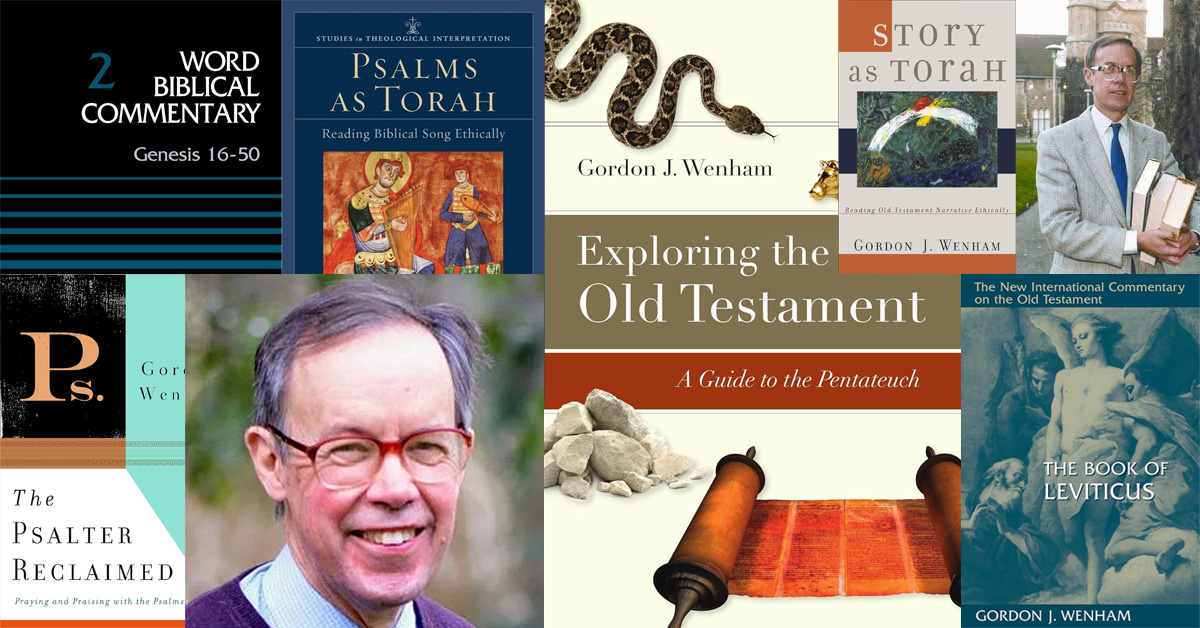
By Craig G. Bartholomew
Last week Gordon Wenham passed on to glory.
We lament his passing but celebrate his rich life.
Gordon was so many things: husband to Lynne, father to his children and grandfather to his grandchildren, brother to his siblings, son to his parents, and so much more.
I first encountered Gordon as a young theology student through his commentaries and articles. When I was at Oxford I got to know his father, John Wenham, himself a distinguished theologian and author, and his brother David, a distinguished NT scholar. Gordon, of course, opted for OT studies and his major commentaries on Genesis, Leviticus and Numbers are well known. His PhD was on Deuteronomy.
When it came time for me to do my PhD my first choice of supervisor was Gordon. Why? Having studied at a Bible College steeped in Puritan Reformed theology while doing a B.Th. through UNISA, and then being exposed to the evangelical and liberal theology of Oxford, what I admired so much about Gordon was his deep commitment to Evangelicalism and orthodox Christianity while engaging deeply with the mainstream of OT studies and other disciplines, making as a result a remarkably rich contribution.
By then Gordon had moved back from Queen’s University, Belfast, to Cheltenham and Gloucester College of Higher Education (CGCHE). He was one of few faculty there who took on doctoral students, awarded by the University of Bristol. Wonderfully, I was able to get a scholarship to do my doctorate under his supervision. Once I completed my PhD Gordon applied for funding from the Kirby Laing Foundation that made my post-doctoral fellowship possible and then later becoming a Senior Research Fellow in the department, with Gordon now as a colleague.
As the years passed he supervised many, many doctorates and when CGCHE became the University of Gloucestershire (UOG) his supervision of PhD students and his scholarship played an important part. Indeed, it was under his leadership and contribution that biblical studies at the UOG became internationally known and recruited students from all over the world. The department of Religion and Theology became the centre of research excellence at the UOG. Sadly, this did not last, when repeated, partially successful attempts were made to close down the Religion and Theology department.
Gordon was exceptionally well educated, fluent in the major European languages and in modern Hebrew and related Semitic languages. It was not uncommon to find him working slowly through a new monograph in modern Hebrew or a monograph in Dutch on Deuteronomy. He was a scholar’s scholar but also a visionary, always alert to developing biblical studies at the UOG and far beyond. He was also a churchman through and through, and loved preaching.
In my view, Gordon was one of the greatest OT scholars of our day. When he entered OT studies, the discipline was very polarised in comparison to NT studies. Once historical criticism took hold, it spread throughout all major Western and non-western faculties. At Cambridge the triumvirate of Westcott, Lightfoot and Hort played a critical role in mapping out a rigorous moderately critical agenda and executing it to a major extent. This paved the way for many, outstanding, moderately critical Christian scholars in NT, scholars like C. H. Dodd, C. F. D. Moule, G.B. Caird, and many others.
There was no such parallel development in OT studies which, to this day, remains very polarised. Gordon did for OT studies the sort of work that the Cambridge triumvirate did for NT scholars. And he did it generously and with excellence. He was very gifted, always curious, always open to dialogue, and wonderfully humble in a gloriously English way. Indeed, I doubt he knew just how significant a scholar he was. Through his research and students he has bequeathed a truly remarkable legacy that continues this sort of vital work in OT studies.
As we mourn our loss, I encourage us to be very un-English!! in seeing Gordon for who he was, and celebrating his life and achievements. We honour him by really seeing his contribution for what it was, receiving it, and developing it together to enhance the reputation of the trinitarian God in the rich fields of OT study. Studying under and working with Gordon was one of the greatest privileges of my life.